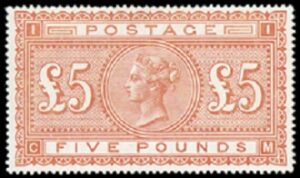 What Can Be Done: Collecting the stamps of Great Britain is one of the most popular philatelic specialties. GB issued the first stamps and the country offers many exciting specialty opportunities. The classic stamps were all printed with check letters which means that each stamp can be obtained in 240 different combinations of check letters. The classic 1 Penny stamp has over 150 plates, which can be collected in 240 positions for each plate making thousands of varieties of this inexpensive stamp alone that one can specialize in. GB philately easily breaks down into differing periods (Victoria: 1840-1900, the Kings: 1901-1953, and the Queen Elizabeth period: post 1953), that make further specialization possible, and even the most modern period has hundreds of printing varieties and types that make for very interesting collecting.
What Can Be Done: Collecting the stamps of Great Britain is one of the most popular philatelic specialties. GB issued the first stamps and the country offers many exciting specialty opportunities. The classic stamps were all printed with check letters which means that each stamp can be obtained in 240 different combinations of check letters. The classic 1 Penny stamp has over 150 plates, which can be collected in 240 positions for each plate making thousands of varieties of this inexpensive stamp alone that one can specialize in. GB philately easily breaks down into differing periods (Victoria: 1840-1900, the Kings: 1901-1953, and the Queen Elizabeth period: post 1953), that make further specialization possible, and even the most modern period has hundreds of printing varieties and types that make for very interesting collecting.
Specialty Catalogs: Scott does a pretty good job with the stamps of Great Britain. Their listings are clear and concise. The Scott Classic Specialized catalog is very in depth on the issues that are covered with plate number prices and cover prices, prices for multiples, and in some cases cancellations. The main specialty catalog for collecting GB stamps is the Stanley Gibbons catalog. It is far more specialized than Scott especially in the twentieth century philately.
Specialty Album: The Scott Specialty album is very good as is the Lighthouse hingeless specialty album. The Gibbons album is overspecialized as to shades and will leave a collector feeling that he can never finish a page.
 Expense: Great Britain has issued many expensive stamps. There are five or six individual stamps that can sell for up to $2,000 each (excluding Officials). That means there are many scarce stamps. But there are no rarities. The US, for instance, has major number stamps (that is, not varieties) that catalog up to $50,000 each making completion impossible for any but Midas. GB can be completed for $20,000 or less (and completed except for five or six stamps for under $5,000). Many specialist collectors of GB avoid collecting the Official stamps. All of them are just overprints on regular issues and so have been forged, and many catalog enormous amounts of money. Avoiding them then eliminates two problems—forgery concern (there are no forgeries of regular GB stamps) and cost.
Expense: Great Britain has issued many expensive stamps. There are five or six individual stamps that can sell for up to $2,000 each (excluding Officials). That means there are many scarce stamps. But there are no rarities. The US, for instance, has major number stamps (that is, not varieties) that catalog up to $50,000 each making completion impossible for any but Midas. GB can be completed for $20,000 or less (and completed except for five or six stamps for under $5,000). Many specialist collectors of GB avoid collecting the Official stamps. All of them are just overprints on regular issues and so have been forged, and many catalog enormous amounts of money. Avoiding them then eliminates two problems—forgery concern (there are no forgeries of regular GB stamps) and cost.
Availability of Material: As the country that issued the first postage stamp, GB has always had a vigorous community of philatelists interested in her stamps. Nearly every issue was saved in some quality. Expensive GB stamps are costly because they have many people looking to buy them (not because they are great rarities), so specialists in Great Britain can usually find stamps to add to their collection.
Overall Collecting Grade: A
